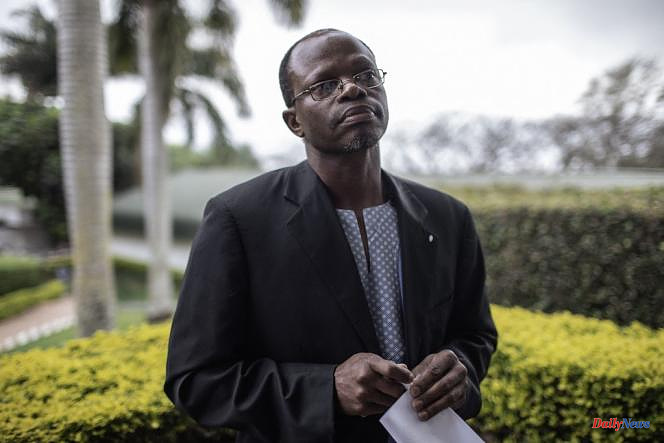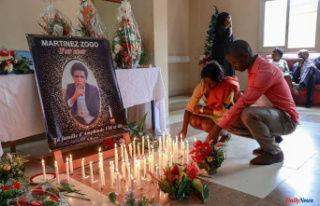The revolt that has been brewing for more than a year and a half in the last absolute monarchy in Africa is an orphan. On Saturday January 21, lawyer Thulani Maseko was killed in front of his wife and two children while watching television in his living room, about fifty kilometers from the capital of Eswatini, Mbabane. He was one of the pillars of the uprising which has shaken the small kingdom landlocked between South Africa and Mozambique since 2021. Supporters of the pro-democracy movement denounce an assassination aimed at stifling one of the dominant voices of protest. After his death, they hope for a "turning point" as condemnations rain down on all sides.
"They didn't even come in, they shot him through the window and left," Mfanafuthi Tsela, spokesperson for the Swaziland Solidarity Network (SSN), a pro-democracy activist group, said of the attackers. The official rules out the possibility of a burglary that would have gone wrong and recalls, like others, that a few hours earlier, King Mswati III warned his opponents.
"Don't come complaining that mercenaries are taking care of you," the monarch said in a speech accusing opponents of being behind the violence rocking the kingdom. In a statement, the government of Eswatini assures that an investigation is underway and warns against "speculation and insinuations peddled on social networks".
Aged 52, Thulani Maseko was "the beating heart of the Swazi struggle", said Sboniso Mkhabela, head of international relations at the People's United Democratic Movement (Pudemo), the main opposition party, officially banned in the country. In June 2021, for the first time in the history of Eswatini, thousands of demonstrators demand democratic reforms as three MPs propose to elect the Prime Minister, appointed by the King. The crackdown left dozens dead.
Long-time opponent of the regime
At the head of the Swaziland Multi Stakeholder Forum, an organization bringing together actors (parties, unions, associations) who call for the establishment of a multiparty democracy, Thulani Maseko "had made it possible to unify the movement and coordinate mass demonstrations “, continues Sboniso Mkhabela.
A longtime opponent of the regime, the lawyer was sentenced to two years in prison in 2014 for criticizing the judicial system. More recently, in 2018, he had challenged in court the decision of King Mswati III to arbitrarily rename the country, until then known as Swaziland – opponents continue to use this name. Often criticized but rarely challenged, Mswati III is decried for his extravagant lifestyle in one of the poorest countries in the world. In 2019, he notably offered a fleet of nineteen Rolls-Royces to his mother and his fifteen wives.
In October 2021, after several months of mobilization, the monarch agreed to open a "national dialogue" under pressure from the Southern Africa Development Community (SADC), which brings together sixteen states in the region. But nearly a year and a half later, the dialogue has remained a dead letter while the protest has mutated.
Faced with repression, the demonstrations gave way to strikes in transport in particular and targeted violence claimed by the Solidarity Forces of Swaziland, a group of anonymous militants who attack official buildings and police forces - a dozen police officers were killed. "A civil war is in the making," says Sboniso Mkhabela.
"Mercenaries" to stifle dissent?
The government explains that the violence makes it impossible to hold a "dialogue" and accuses "foreign-funded terrorists" of being responsible for the deterioration of the situation. “The king is not ready for dialogue. He is willing to kill to stay in power. His attitude is not that of someone who wants to argue, it's that of a dictator, "denounces the head of Pudemo.
In recent weeks, pro-democracy groups have accused the regime of having recruited "mercenaries" to stifle protest. "There were extrajudicial executions," said Mfanafuthi Tsela, spokesperson for the Swaziland Solidarity Network, referring to the presence of "masked white men" alongside the police at the checkpoints.
Accused of being at the head of these "mercenaries", South African Arno Pienaar, founder of the security company Bastion Security, confirmed to the British newspaper The Times that he signed a security contract with the Swazi regime, but he denies be the source of any abuses. "We do training, saying we are mercenaries or killers doesn't make sense," said the former soldier who served under the apartheid regime. He also denies any involvement in the death of Thulani Maseko. "There was no reason to kill him, he was not on our terrorist list," the Afrikaner continues. He believes that the death of the activist would be the result of internal dissension in the pro-democracy movement.
"Death of such a giant"
Since the death of Thulani Maseko, convictions have multiplied. In a press release, the European Union refers to an "assassination" and calls on the authorities of Eswatini to "ensure the safety of all citizens, including political activists". The United Nations calls for a "swift, independent, impartial and effective" investigation. The United States, the African Union, the Southern African Development Community (SADC) are also calling for "a transparent investigation".
"We have seen the messages from the international community, but we hope it will not stop at condolences," hopes Sboniso Mkhabela. He wants to believe that the death of the activist could "rekindle" the protest when many no longer dare to demonstrate, for fear of the police. "One cannot imagine that the death of such a giant could have no consequences," he adds. Visiting the kingdom three days after the death of Thulani Maseko, the Russian Foreign Minister, Sergei Lavrov, for his part offered his support to the regime. "Russia is ready to help Eswatini train its security personnel," Sergei Lavrov said.












